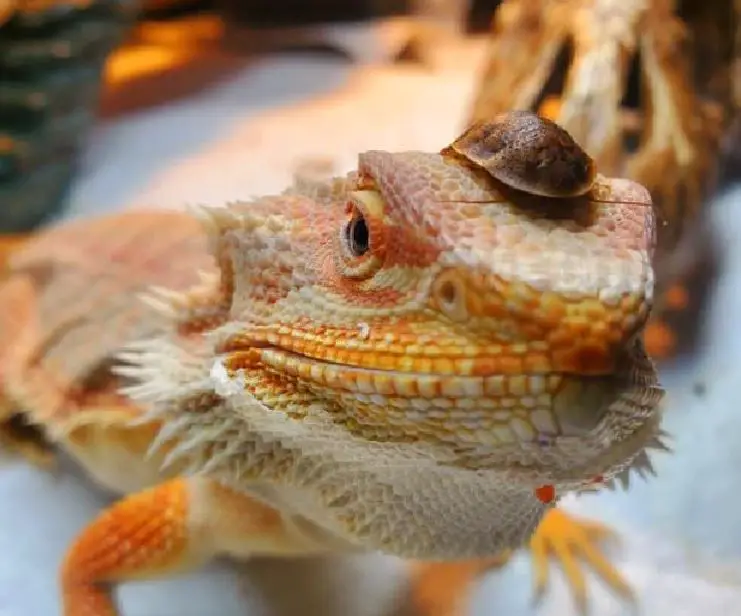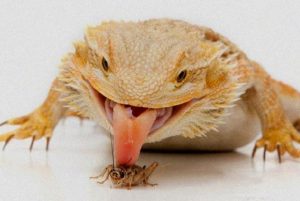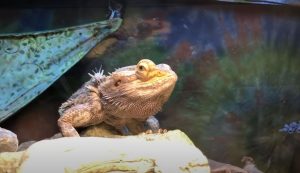Are you looking for the best insects for bearded dragons? Beardies are omnivores so they love eating insects, fruits, and vegetables.
I would like to give you some information about a proper diet for bearded dragons as well as the best options according to my experience.
So, don’t hesitate to have a closer look at this article. Let’s start reading and exploring the best insect to feed bearded dragons.
The Top-Rated Bearded Dragon Insects (Recommendations)
#1. FLUKERS MEDLEY REPTILE TREAT – BEST MEDLEY FOOD
#2. MBTP BULK DRIED MEALWORMS – BEST DRIED MEALWORMS
#3. MBTP BULK DRIED MEALWORMS – BEST DRIED MEALWORMS
#4. PREDATOR FOODS BULK LIVE MEALWORMS – BEST LIVE MEALWORMS
#5. 250CT LIVE SUPERWORMS, FEED REPTILE – BEST LIVE SUPERWORMS
#6. JOSH’S FROGS WAXWORMS – BEST WAXWORMS
#7. BLAPTICA DUBIA ROACHES – BEST DUBIA ROACHES
#8. FLUKER’S FREEZE-DRIED CRICKETS
#9. FLUKER’S FREEZE-DRIED MEALWORMS
Related:
- Bearded Dragon Lethargic
- Why is My BD Hissing at Me?
- Why Is My BD Closing Eyes When Stroked?
- BD Brumation Or Dead – How To Differentiate?
- 30+ Beardie Body Language
Tips to Looking for The Best Bearded Dragons Insects
Being omnivores, beardie can ingest both vegetation and insects such as live earthworms, crickets, cockroaches, and hornworms in the wild while in captivity, the diet of beardie also includes freeze-dried or dehydrated versions of these insects.
This is because commercially prepared beardie foods are so convenient to feed and able to be kept longer than live insects for bearded dragons.
Especially, you can still provide your beardie with live foods, fresh fruits, and veggies beside your beardie commercial foods.
Some Important Things To Look For In Beardie Insects:
- Real ingredients. Freeze-dried or dehydrated insects without any unnecessary additives would be the best option when choosing commercial foods.
- Trustworthy brand. You should do some kinds of research on reputable brands that specialize in reptile products before buying.
- No artificial additives. Artificial colors and flavors are not accepted in a good bearded dragon food as only real, whole-food ingredients are favorable.
- Nutritionally balanced. Commercial beardie foods should have both freeze-dried insects and pellets as the latter will help balance the nutrients. However, your beardie will not be interested in pellets so try to offer a blend of foods.
Best Insects for Bearded Dragons Shortlist (Updated List)
*Ratings are from Amazon at the time of publication and can change
The Best Bearded Dragon Insects Products
#1. FLUKERS MEDLEY REPTILE TREAT – BEST MEDLEY FOOD

Unlike pellet food, the blend is made of real, freeze-dried insects including mealworms, grasshoppers, and crickets.
So, you can store this food for a long time without worrying about losing its freshness.
This product has a great value of nutrients as Flukers added an extra formula to boost proteins, fats, vitamins, and minerals (such as calcium) in the processing of these insects for bearded dragon.
It is an ideal choice for anyone to feed their beardie’s real insects without wasting time living prey.
Pros:
- Great value
- Real insects
- Extra vitamin support
- Stays fresh a long time
Cons:
- Smells strong when opened
- Some insects may end up ground down through shipping
#3. MBTP BULK DRIED MEALWORMS – BEST DRIED MEALWORMS

They are completely safe and clean as it is free from artificial additives and preservatives, which provides a rich source of natural protein.
Moreover, they are gut-loaded so your beardie would be given an added boost of nutrition.
Pros:
- 100% whole dried crickets
- No artificial additives or preservatives
- Gut-loaded before drying for nutrition
Cons:
- Some beardie dislike dried insects
- More expensive than some brands
#3. MBTP BULK DRIED MEALWORMS – BEST DRIED MEALWORMS

Mealworms are known as nutritious food containing up to 51% of Protein, 23% of Crude Fat, 8% of Fiber, and 8% of Moisture, which can provide a very high nutritional diet with higher protein.
Besides beardie, pets such as chicken, duck, wild birds, and so on loving this.
Pros:
- 100% non-GMO (no genetically modified organism food)
- Not contain any additives, preservatives, or fillers
- Worms are large, fresh, and plentiful
#4. PREDATOR FOODS BULK LIVE MEALWORMS – BEST LIVE MEALWORMS

The reason why I mention the Predator Foods product as our top beardie food is its exceptional quality and extraordinary services.
With high nutrition, this product is a smart choice in the list of the best insects for bearded dragons.
Pros:
- Smart package.
- Fat and healthy mealworms
- High-quality and fresh organic food
#5. GIMMINY CRICKETS & WORMS 300CT LIVE SUPERWORMS, FEED REPTILE – BEST LIVE SUPERWORMS
 See Latest Price
See Latest Price

You will find your life so easy when trying this as you can save money by self-raising the food source of the pet.
Pros:
- Well-constructed package
- Stay alive for a long time stored
- Big and healthy
- Reasonable price.
#6. JOSH’S FROGS WAXWORMS – BEST WAXWORMS

This product often gets good feedbacks from most beardie owners because of natural and healthy living insects for bearded dragons.
Your pets will enjoy it on the first try.
Pros:
- Used as supplemental treats for pets
- Big and healthy waxworms
#7. BLAPTICA DUBIA ROACHES – BEST DUBIA ROACHES

Live Dubia roach supplier is always on our top list, and if your beardie is addicted to this kind of food, you shouldn’t hesitate to try it.
Pros:
- A nutritious and alive food source
- Perfect size for a juvenile beardie.
#8. FLUKER’S FREEZE-DRIED CRICKETS

If you are afraid of live insects when feeding your beardie, Freeze-dried crickets from Fluker may be a great alternative to live insects and suitable for many kinds of reptiles, tropical fish, birds, and your beardie.
Just have them sprayed with water and then feed your beardie, they will remain healthy ever after.
Pros:
- Pre-loaded with crude protein not less than 50.1%
- Not deal with the smell of live crickets
#9. FLUKER’S FREEZE-DRIED MEALWORMS

Pros:
- Great sources of vitamins, minerals
- Diversifying your pet amphibian
- Affordable price
- Convenience
Commonly Asked Question About Bearded Dragon Insects
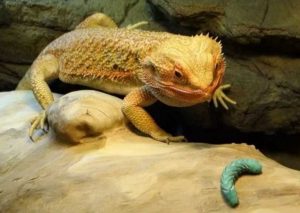
1. What Does Bearded Dragon Eat in The Wild?
In the wild, small insects such as spiders, termites, and crickets are the favorite kind of food for beardies.
Known as seasonally savvy foragers, beardie will also consume flowers and leafy greens when finding them.
The main discrepancy between a beardie’s diet in the wild and captivity is that A LOT more protein is consumed by them in the wild than in captivity.
Roaming around every day makes way more calories burned so extra protein is needed to make sure that they have enough energy.
If a beardie in captivity consumed the same amount of protein as a beardie in the wild, they would likely become obese, which would result in many dangerous health problems.
Related:
- Can Beardies Eat Pears
- Can Beardies Eat Squash?
- Do Beardies Eat Rosemary?
- Can Beardies Eat Brussel Sprouts?
2. What is Best: Pellet Food or Live Insects for Bearded Dragons?
| Pros | Cons | |
|---|---|---|
| Live insects | - Feed BD easily. - Allow BD to practice hunting as its instinct. - Build a connection between you and your pet. - Control nutrition better. - More natural. | - More expensive. - Takes more of your time. Not easy to take care of live insects. |
| Pellet food | - Simple for the owner to use. It requires minimal care of storage. Affordable. - It can be kept for a long time. | - BD don’t like it. - It doesn’t provide as many nutrients as live and real food. - Not as healthy as a primary food source. |
3. How Long Can a Beardie Stay Without Food?
The ability to tolerate hunger can be diverse for each individual and It depends on the age and the wealth of the beardie.
When beardie is mature, they can survive for two months without eating as a variety of fat and weight is stored.
However, they cannot tolerate thirst and will die after a few days.
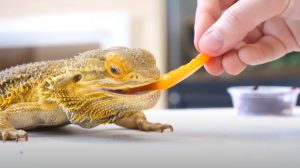
4. What to Do When a Beardie Vomits?
Firstly, the solution is keeping them away from mealworms or super worms and feeding Dubia roaches, Tu Bie Chong, or crickets.
Besides, the food should be as small as possible.
Especially, frozen grasshoppers or crickets are not allowed.
Moreover, you should use probiotics to regulate the intestines for beardie and adjust every 2-3 days.
Finally, glucose, effervescent tablets of vitamin C, saltwater, and probiotics would be helpful.
Related:
- Why Is My Beardie Bobbing His Head?
- How To Tell If Your Beardie Is Happy?
- Why Is My Beardie Breathing Heavy?
- How To Pick Up a BD?
- Can Beardies Get High?
5. What Should I Do When My Bearded Dragon Don’t Eat?
There are many reasons for this case, and the most popular ones are the uncomfortable transport process, the low temperature of the living environment, and the sick or inhibited situation.
Maintain the ambient temperature at about 35 degrees Celsius and check it daily as beardie are cold-blooded animals, which means their digestion requirements depend on the living environment temperature.
In the case of intestinal inflammation, the beardie isn’t more likely to eat anything including insect or salad.
Some medicine with PAC (Poly Aluminum Chloride) or probiotics should be given to them.
Also, you can provide them with oral electrolytes (Mizone). When beardie gets diarrhea, it means they get intestinal inflammation.
Read more:
- Can Beardies Eat Radish Greens?
- Can Beardies Eat Honeydew Melon?
- Do Beardies Eat Chard?
- Can Beardies Eat Dill?
- Can Beardies Eat Peas?
Conclusion
Providing vegetables and insects daily to the species is very important, and proper proportions depend on the age of the pet. If you find the article “Best Insects For Bearded Dragons” useful and interesting, please like and share it with others. Thank you!
Key points to take away when looking for the best insects to feed your bearded dragon:
Choosing the right insects for your bearded dragon is crucial for their health and well-being. Here’s a guide to help you provide a well-balanced and nutritious diet for your beloved reptile:
1. Dubia Roaches:
- Nutritional Value: Dubia roaches are an excellent source of protein, healthy fats, and calcium.
- Digestibility: They are relatively easy for bearded dragons to digest.
- Size Options: Available in various sizes to suit the age and size of your dragon.
2. Crickets:
- Nutritional Value: Crickets are rich in protein and fiber, making them a staple in many bearded dragon diets.
- Variety: They come in different sizes, allowing you to choose appropriate prey based on your dragon’s age and size.
3. Black Soldier Fly Larvae:
- Nutritional Value: These larvae are a great source of calcium, protein, and other essential nutrients.
- High Calcium-to-Phosphorus Ratio: They have an ideal calcium-to-phosphorus ratio, promoting healthy bone development.
4. Superworms:
- Nutritional Value: Superworms are rich in protein and can be used as an occasional treat.
- Size: Suitable for larger bearded dragons due to their size and harder exoskeleton.
5. Phoenix Worms (Calciworms):
- Nutritional Value: Phoenix worms are high in calcium and low in fat, making them a nutritious choice.
- Soft Exoskeleton: Their soft exoskeleton is easier for bearded dragons to consume.
6. Silkworms:
- Nutritional Value: Silkworms are packed with protein and calcium.
- Low Fat Content: They have lower fat content, making them a healthy choice.
7. Hornworms:
- Nutritional Value: Hornworms are water-rich and can help keep your dragon hydrated.
- High in Calcium: They provide a good dose of calcium as well.
8. Feeding Variety:
- Rotation is Key: Rotate the types of insects you feed to provide a balanced diet and prevent your dragon from becoming picky.
9. Gut Loading:
- Nutrient-Rich Diet: Ensure the insects are well-fed and “gut loaded” with nutritious foods before offering them to your dragon.
10. Dusting:
- Supplement with Calcium and Vitamins: Dust the insects with calcium powder and a reptile multivitamin supplement to fill any nutritional gaps.
11. Live Prey vs. Pre-Killed:
- Live Prey: Some bearded dragons prefer live prey, which can stimulate their hunting instincts.
- Pre-Killed: Pre-killed insects can be a safer option, as they don’t pose a risk of injury to your pet.
12. Caution with Wild-Caught Insects:
- Avoid Wild-Caught: Refrain from feeding wild-caught insects to prevent the introduction of potential parasites or pesticides.
Conclusion:
The right selection of insects is vital for your bearded dragon’s overall health and nutrition. By offering a variety of insects, gut loading them with nutrient-rich foods, and supplementing as needed, you can ensure a well-balanced and delicious diet for your beloved reptile. Always consider your dragon’s age, size, and individual preferences when choosing their prey.
Further Reading:
- BDs Male Or Female: What Is Better Pet?
- Best Beardie Leash And Harness Reviews
- Fancy BD vs Bearded Dragon – Which one is the best?
- How Often To Trim BD Nails? A Detailed Guide
- Best Father’s Day Gifts For Pet Lovers
- 30+ Signs Of An Unhealthy Beardie

